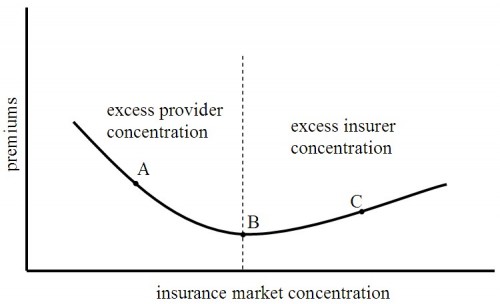I said this more than a year ago about my concern with the ACA and ACOs:
Moreover, this still doesn’t address the real problem that as providers consolidate, they have increased market power, which can lead to spending increases and premium increases. That would be the exact opposite of what people want out of ACOs, and I have not seen this concern yet adequately addressed.
Austin said this more than two years ago:
Recall that this graph is drawn for a fixed level of provider market concentration. While provider payment reform (via ACOs) may lower public costs, additional provider market power will push the system further toward the left along this curve (toward the point “A”). Private costs and premiums could rise. (Note, this is not the standard cost shifting argument. Private costs don’t rise because public payments fall. They rise due to changes in the balance of market power between providers and insurers.)
Austin said this more than three years ago:
If health care providers have relatively more power they can charge relatively higher prices. That’s bad for consumers. On the other hand, if insurers have relatively more power they can bargain down the price of care. That’s good for consumers if those lower prices are passed on to them in the form of lower premiums. (Also, lower premiums mean lower tax-funded subsidies. That’s good for taxpayers.)
Here’s the shocking news everyone seems to be covering today:
Greater competition in the insurance industry — either through health insurance exchanges or other measures — may not lower insurance premiums. Weakening insurers’ bargaining power could instead translate into higher costs for all of us in the form of higher premiums.
There are days I wish everyone would just read this blog already.


